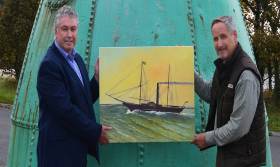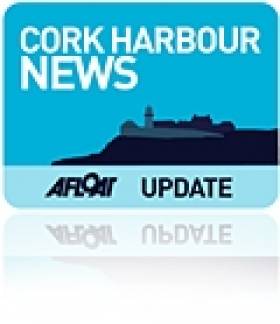Displaying items by tag: paddle steamer
On Monday 13th November 1826, 190 years ago, the new paddle steamer 'Town of Drogheda' arrived at her home port having come from the Clyde in Scotland. The vessel was the very first vessel belonging to the newly formed Drogheda Steampacket Company and for the next 22 years she would sail weekly between Drogheda and Liverpool.
The vessel marked the beginning of a golden age for Drogheda and steamship travel which would last 80 years. The steampacket company operated 16 vessels over the period to both Liverpool and Glasgow.
On its arrival into Drogheda, the Journal of 1826 contrasted the crimson and gold silk lace in the ladies' cabin with the blue cloth upholstery covering the berths reserved for the gentlemen. The holds could accommodate up to 100 horned cattle or 300 sheep.
The 'Town of Drogheda' made her maiden voyage to Liverpool on the 26th November, 1826 and the journey took 14 hours. The master of the vessel on its maiden voyage was Captain Thomas Bishop.
Built by John Scott & Co in Greenock the vessel was 140 feet in length and wooden built. In addition to carrying cargo the vessel also accommodated passengers. The passenger accommodation was extremely luxurious and the vessel state room was mahogany with rosewood pillars and a fireplace. The dining table could accommodate up to 30 persons at a sitting.
The steam engines at the time were state of the art putting out 110 nominal horse power through the two paddles, enough to keep the vessel moving through the biggest of storms on the Irish sea.
There are no know drawings or paintings of the vessel but in order to commemorate the 190 year anniversary, research was undertaken by the port company through contemporary maritime resources, the William Simmons\Scott archives which are held at Glasgow University and the assistance of Brendan Matthews of the old Drogheda Society.
From rare plans and drawings of sister vessels from Greenock ship yard and through a unique collaboration with local artist Raymond Balfe the vessel has been brought back to life in an oil painting to commemorate the vessels 190th anniversary on going into service and the beginning of Drogheda’s golden age of steam ship travel.
Mr Raymond Balfe said “I was delighted to be asked by the port to work on this challenging project. It was something very interesting and different for me as an artist. I tried to make the painting of its time. How amazing it would be today if you could still catch a ship from Drogheda to Liverpool.”
Mr Paul Fleming commented “It was fantastic working with Raymond to bring the historic steamship ‘Town of Drogheda’ back to life just in time for its 190th anniversary. The painting is a fantastic depiction of the vessel arriving at the Drogheda bar in 1826 based on existing maritime resources from the original shipyard and the port archives”
The vessel sailed under the British red ensign and the Drogheda Steampacket Company flag which was a white star and crescent on a lime green background, which was described as a lime green with a white five pointed star between the horns. Its distinctive funnel and steam whistle was jet black, as were all the Drogheda Steampacket vessels.
The vessel was eventually sold in 1848 and was abandoned and foundered approximately 120 miles east of Gibraltar all the crew being saved in 1849.
New Book on Cork Documents Development of Harbour City
#CORK HARBOUR - A never-before-seen collection of images and memorabilia from Cork celebrating the harbour city and its heritage has just been published, the Cork Independent reports.
Pure Cork features photos, postcards, maps and other items collected by Blarney Street native Michael Lenihan over the last 40 years, and he claims that "95 per cent" of them have never been seen before.
The selection represents just a fraction of the more than 2,000 postcards and countless photographs in Lenihan's collection.
From paddle steamer boats in the famous harbour to the landing of the first plane at Cork Airport in the 1960s, the changing face of transport in the city is also documented.
Pure Cork is available in bookshops across Cork, priced at €25. An exhibition of original photos from Lenihan's collection is also on display at Liam O'Shea's Bookshop on Oliver Plunkett Street.
The Cork Independent has more on the story HERE.

























































